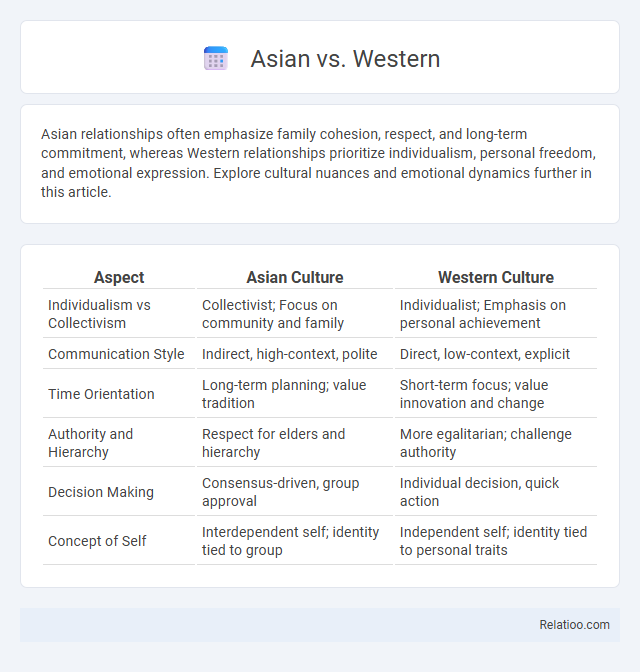Asian relationships often emphasize family cohesion, respect, and long-term commitment, whereas Western relationships prioritize individualism, personal freedom, and emotional expression. Explore cultural nuances and emotional dynamics further in this article.
Table of Comparison
| Aspect | Asian Culture | Western Culture |
|---|---|---|
| Individualism vs Collectivism | Collectivist; Focus on community and family | Individualist; Emphasis on personal achievement |
| Communication Style | Indirect, high-context, polite | Direct, low-context, explicit |
| Time Orientation | Long-term planning; value tradition | Short-term focus; value innovation and change |
| Authority and Hierarchy | Respect for elders and hierarchy | More egalitarian; challenge authority |
| Decision Making | Consensus-driven, group approval | Individual decision, quick action |
| Concept of Self | Interdependent self; identity tied to group | Independent self; identity tied to personal traits |
Cultural Values: Eastern Collectivism vs. Western Individualism
Eastern cultures emphasize collectivism, where respect for elders stems from deep-rooted family bonds and social harmony, prioritizing group cohesion over individual desires. Western cultures highlight individualism, valuing personal autonomy and self-expression, often leading to more egalitarian relationships between generations. This fundamental cultural difference shapes how respect for elders is expressed, with Eastern societies upholding hierarchical family structures and Western societies promoting mutual respect based on personal merit.
Education Systems: Discipline and Creativity
Asian education systems often emphasize discipline, rote learning, and respect for authority, fostering a structured environment where elder respect is ingrained through hierarchical teacher-student relationships. Western education models prioritize creativity, critical thinking, and individuality, encouraging students to challenge ideas while maintaining respect for elders in a more informal and question-friendly manner. The contrast highlights how cultural values shape educational approaches: Asian systems link elder respect to obedience and academic rigor, whereas Western systems associate it with open dialogue and innovative expression.
Communication Styles: Indirect vs. Direct Approaches
Asian cultures typically employ indirect communication styles in showing elder respect, using subtle cues, honorifics, and non-verbal gestures to convey deference and avoid confrontation. In contrast, Western cultures favor direct communication, emphasizing clear, explicit verbal expressions and open dialogue as a sign of respect and understanding. These contrasting approaches highlight the cultural importance placed on harmony and hierarchy in Asian societies versus individualism and transparency in Western contexts.
Family Structures: Hierarchies and Independence
Asian family structures emphasize hierarchical respect, where elders hold authority and decision-making power, reinforcing intergenerational dependence and collective harmony. Western families prioritize individual independence, encouraging open dialogue and personal choice, resulting in more egalitarian relationships between generations. Elder respect varies accordingly, with Asians showing deference through duty and care, while Western cultures emphasize respect via autonomy and mutual understanding.
Business Practices: Relationship Building vs. Efficiency
Asian business practices emphasize relationship building and trust, often prioritizing long-term partnerships and personal connections over immediate results. Western approaches typically focus on efficiency, valuing punctuality, clear communication, and quick decision-making to maximize productivity. Understanding these cultural nuances can help you navigate international business effectively, balancing respect for hierarchy with the need for streamlined operations.
Health and Wellness Perspectives
Asian cultures often emphasize holistic health practices rooted in traditional medicine, valuing elder wisdom as essential to wellness and community balance. Western perspectives typically prioritize individual health autonomy and scientific approaches, with elder care focusing on medical support and quality of life enhancements. Your understanding of these diverse health and wellness attitudes can improve cross-cultural respect and elder care strategies.
Work Ethic and Career Aspirations
Asian work ethic emphasizes diligence, discipline, and collective success, often driven by respect for elders who symbolize wisdom and guidance in career development. Western work culture prioritizes individual ambition, innovation, and self-promotion, with elder respect manifesting through professional mentorship rather than hierarchical obligation. Understanding these cultural dynamics can shape Your career aspirations by balancing collaborative respect with personal achievement.
Traditions and Modernity
Asian cultures deeply root elder respect in Confucian traditions emphasizing filial piety and communal harmony, blending these values with modern societal changes. Western societies prioritize individualism, often expressing elder respect through legal protections and social services rather than strict traditional rituals. While modernization challenges traditional reverence globally, Asian cultures actively integrate contemporary lifestyles with longstanding practices, whereas Western cultures adapt elder respect within evolving social norms and institutional frameworks.
Social Etiquette and Manners
Asian social etiquette emphasizes deep respect for elders through formal greetings, bowing, and attentive listening, reflecting hierarchical cultural values. In Western cultures, respect is often shown through eye contact, firm handshakes, and addressing elders by their first or last names, focusing on equality and individualism. Your understanding of these differing manners can enhance cross-cultural communication and demonstrate genuine respect in diverse social settings.
Media and Entertainment Preferences
Asian media and entertainment often emphasize family-centered narratives and traditional values, reflecting deep respect for elders through storytelling that highlights honor and filial piety. Western media tends to prioritize individualism and youthful independence, frequently portraying elders as mentors or secondary characters rather than central figures. You may notice that Asian audiences engage more with content featuring elder wisdom and multi-generational bonds, while Western viewers prefer entertainment showcasing personal growth and diverse, contemporary lifestyles.

Infographic: Asian vs Western
 relatioo.com
relatioo.com